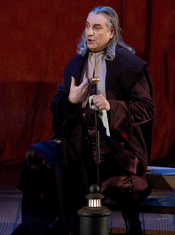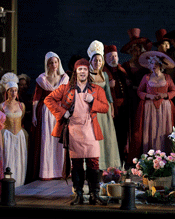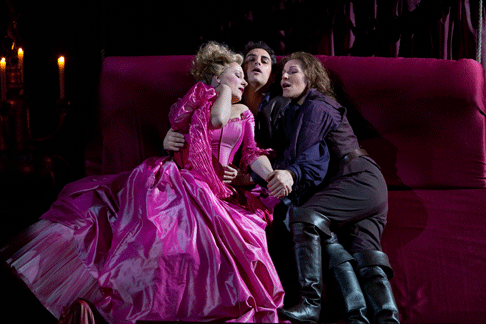![Juan Diego Flórez as Count Ory (disguised as the Nun) [Photo by Marty Sohl courtesy of The Metropolitan Opera]](http://www.operatoday.com/COMTE_ORY_Florez_as_title_r.gif)
28 Mar 2011
Le Comte Ory, Metropolitan Opera
Rossini’s penultimate stage work, Le Comte Ory, belongs to the tradition of sexy scoundrel operas, along with such works as Don Giovanni, Zampa, Fra Diavolo, Barbe-Bleu, Les Brigands and Threepenny Opera.
English Touring Opera are delighted to announce a season of lyric monodramas to tour nationally from October to December. The season features music for solo singer and piano by Argento, Britten, Tippett and Shostakovich with a bold and inventive approach to making opera during social distancing.
This tenth of ten Live from London concerts was in fact a recorded live performance from California. It was no less enjoyable for that, and it was also uplifting to learn that this wasn’t in fact the ‘last’ LfL event that we will be able to enjoy, courtesy of VOCES8 and their fellow vocal ensembles (more below …).
Ever since Wigmore Hall announced their superb series of autumn concerts, all streamed live and available free of charge, I’d been looking forward to this song recital by Ian Bostridge and Imogen Cooper.
Although Stile Antico’s programme article for their Live from London recital introduced their selection from the many treasures of the English Renaissance in the context of the theological debates and upheavals of the Tudor and Elizabethan years, their performance was more evocative of private chamber music than of public liturgy.
Evidently, face masks don’t stifle appreciative “Bravo!”s. And, reducing audience numbers doesn’t lower the volume of such acclamations. For, the audience at Wigmore Hall gave soprano Elizabeth Llewellyn and pianist Simon Lepper a greatly deserved warm reception and hearty response following this lunchtime recital of late-Romantic song.
For this week’s Live from London vocal recital we moved from the home of VOCES8, St Anne and St Agnes in the City of London, to Kings Place, where The Sixteen - who have been associate artists at the venue for some time - presented a programme of music and words bound together by the theme of ‘reflection’.
'Such is your divine Disposation that both you excellently understand, and royally entertaine the Exercise of Musicke.’
‘And there was war in heaven: Michael and his angels fought against the dragon; and the dragon fought and his angels, And prevailed not; neither was their place found any more in heaven … that old serpent … Satan, which deceiveth the whole world: he was cast out into the earth, and his angels were cast out with him.’
There was never any doubt that the fifth of the twelve Met Stars Live in Concert broadcasts was going to be a palpably intense and vivid event, as well as a musically stunning and theatrically enervating experience.
‘Love’ was the theme for this Live from London performance by Apollo5. Given the complexity and diversity of that human emotion, and Apollo5’s reputation for versatility and diverse repertoire, ranging from Renaissance choral music to jazz, from contemporary classical works to popular song, it was no surprise that their programme spanned 500 years and several musical styles.
The Academy of St Martin in the Fields have titled their autumn series of eight concerts - which are taking place at 5pm and 7.30pm on two Saturdays each month at their home venue in Trafalgar Square, and being filmed for streaming the following Thursday - ‘re:connect’.
The London Symphony Orchestra opened their Autumn 2020 season with a homage to Oliver Knussen, who died at the age of 66 in July 2018. The programme traced a national musical lineage through the twentieth century, from Britten to Knussen, on to Mark-Anthony Turnage, and entwining the LSO and Rattle too.
With the Live from London digital vocal festival entering the second half of the series, the festival’s host, VOCES8, returned to their home at St Annes and St Agnes in the City of London to present a sequence of ‘Choral Dances’ - vocal music inspired by dance, embracing diverse genres from the Renaissance madrigal to swing jazz.
Just a few unison string wriggles from the opening of Mozart’s overture to Le nozze di Figaro are enough to make any opera-lover perch on the edge of their seat, in excited anticipation of the drama in music to come, so there could be no other curtain-raiser for this Gala Concert at the Royal Opera House, the latest instalment from ‘their House’ to ‘our houses’.
"Before the ending of the day, creator of all things, we pray that, with your accustomed mercy, you may watch over us."
The doors at The Metropolitan Opera will not open to live audiences until 2021 at the earliest, and the likelihood of normal operatic life resuming in cities around the world looks but a distant dream at present. But, while we may not be invited from our homes into the opera house for some time yet, with its free daily screenings of past productions and its pay-per-view Met Stars Live in Concert series, the Met continues to bring opera into our homes.
Music-making at this year’s Grange Festival Opera may have fallen silent in June and July, but the country house and extensive grounds of The Grange provided an ideal setting for a weekend of twelve specially conceived ‘promenade’ performances encompassing music and dance.
There’s a “slide of harmony” and “all the bones leave your body at that moment and you collapse to the floor, it’s so extraordinary.”
“Music for a while, shall all your cares beguile.”
The hum of bees rising from myriad scented blooms; gentle strains of birdsong; the cheerful chatter of picnickers beside a still lake; decorous thwacks of leather on willow; song and music floating through the warm evening air.
![Juan Diego Flórez as Count Ory (disguised as the Nun) [Photo by Marty Sohl courtesy of The Metropolitan Opera]](http://www.operatoday.com/COMTE_ORY_Florez_as_title_r.gif)
Rossini’s penultimate stage work, Le Comte Ory, belongs to the tradition of sexy scoundrel operas, along with such works as Don Giovanni, Zampa, Fra Diavolo, Barbe-Bleu, Les Brigands and Threepenny Opera.
You could make a case for adding supernatural scamps like Der Vampyr and Tannhäuser to the list. The hero may be a rogue—in fact, rogue is his job description—and may even be a cutthroat or worse, but he’s a lovable fellow for all that. And he almost never gets to home plate with the ladies whose hearts he flutters; the censors wouldn’t have stood for it. Thus the joke of Gilbert and Sullivan’s spoof in The Pirates of Penzance: Their chorus-full of reckless rogues lust “to be married with impunity” to the bevy of helpless females they are about to abduct. (Is it coincidence that most of the sexy scoundrel operas are French? No.)
 Michele Pertusi as The Tutor
Michele Pertusi as The Tutor
The censors wouldn’t have stood for it then, but there are no censors now, and opera directors are all for full disclosure. This mars Bartlett Sher’s colorful if bare-bones staging of Le Comte Ory for the Met. Consider the final trio: Ory, our scoundrel, has disguised himself as a nun in order to enter Countess Adèle’s bed in her darkened chamber. Unbeknownst to him (but obvious enough to us), Adèle’s young suitor, Isolier, is also present, and in fact the Count is embracing Isolier as Isolier embraces Adèle. If this seems a bit racy for 1828, even in Paris, ne vous-inquiètez pas: Isolier is played by a mezzo soprano. Audiences didn’t mind watching a man fiddle with a boy so long as the boy was obviously a woman. (The first time I saw this opera, Lucky Pierre—sorry, Isolier—was played by a countertenor; he seemed to be enjoying the situation.)
But in Sher’s production, all three persons scramble around each other among the bedclothes as if this were just an ordinary three-way with no story to tell, and it is impossible for the Count not to be aware that he is in bed with two other people. Adèle, too, should not be aware of what is going on; here she’s a merry participant. It may seem a small point, and everybody around me found the slapstick hilarious, but the premises of farce must be taken seriously for the mad machine to work properly. Either Joyce DiDonato is a man or she isn’t; if she isn’t, why does Adèle hope to marry her? If she is, why does the skirt-chasing Count enjoy being in bed with him? It’s as if Lucy schemed to divorce Desi and demanded custody of his band: It violates the clear farcical contract for which we have been so carefully set up.
 Stéphane Degout as Raimbaud
Stéphane Degout as Raimbaud
Sher, as in his previous Met shows, Barbiere and Hoffmann, is always willing to dump the plot to insert a dumb joke; this was also true in his disastrous staging of Women on the Verge of a Nervous Breakdown. He only seems capable of theatrical discipline if the piece is, like South Pacific, sacrosanct, guarded by those who can keep him in line. He has no theatrical clarity of his own. Is this sort of anything-for-a-laugh mayhem what Peter Gelb means when he refers to a “new realism” in the opera house?
The singers have been encouraged not to play this charming piece straight. I would find the evening pleasanter (and probably funnier) if Diana Damrau, a fine singer as well as a fine comic actress, sang the dizzy Countess’s fruity tunes with a bit more attention to proper line and with fewer wildly mugged high notes, and if Juan Diego Flórez’s nasal tenor, never the most sensuous of instruments, were not quite so dry. He is choosing roles lately that do not exhibit his extraordinary virtuosity, and his is not an instrument to make it in bel canto otherwise. There are many far prettier tenor voices around.
 Diana Damrau as Countess Adle, Joyce DiDonato as Isolier, and Juan Diego Flórez as Count Ory
Diana Damrau as Countess Adle, Joyce DiDonato as Isolier, and Juan Diego Flórez as Count Ory
What, I wonder, would Rothenberger and Gedda have made of the bedroom trio? With, say, Teresa Berganza as Isolier? I can’t help thinking they’d have each contrived to keep one foot on the floor, in old-time Hollywood fashion, but they would still have been funnier than Sher’s staging, and they would have sounded like a glimpse of heaven.
Joyce DiDonato, as Isolier, is a lovely performer who does not let her farce-making get in the way of torrents of beautiful Rossini, as heartfelt as they are pure. She is the reason to visit Le Comte Ory and the reason to linger to the very end. Susanne Resmark revealed a most attractive alto voice with more to display than was evident here in the Margaret Dumont-like housekeeper role. Michele Pertusi was all that could be desired as the Tutor and Stéphane Degout filled our grateful ears with dark baritone during his drinking song. Maurizio Benini kept the orchestral sound low so as not to interfere with singers’ audibility, though as Sher (as usual) pushed them all to the edge of the stage apron, this was probably unnecessary. In the old days, and not so very old either, singers could fill the Met from mid-stage and revel in the filling.
John Yohalem